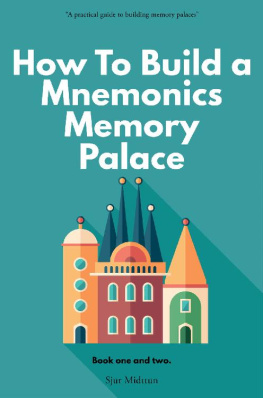Mnemonology
ESSAYS IN COGNITIVE PSYCHOLOGY
North American Editors:
Henry L. Roediger, III , Washington University in St. Louis
James R. Pomerantz , Rice University
European Editors:
Alan D. Baddeley , University of York
Vicki Bruce , University of Edinburgh
Jonathan Grainger, Universit de Provence
Essays in Cognitive Psychology is designed to meet the need for rapid publication of brief volumes in cognitive psychology. Primary topics will include perception, movement and action, attention, memory, mental representation, language and problem solving. Furthermore, the series seeks to define cognitive psychology in its broadest sense, encompassing all topics either informed by, or informing, the study of mental processes. As such, it covers a wide range of subjects including computational approaches to cognition, cognitive neuroscience, social cognition, and cognitive development, as well as areas more traditionally defined as cognitive psychology. Each volume in the series will make a conceptual contribution to the topic by reviewing and synthesizing the existing research literature, by advancing theory in the area, or by some combination of these missions. The principal aim is that authors will provide an overview of their own highly successful research program in an area. It is also expected that volumes will, to some extent, include an assessment of current knowledge and identification of possible future trends in research. Each book will be a self-contained unit supplying the advanced reader with a well-structured review of the work described and evaluated.
Forthcoming
Mulligan: Implicit Memory
Brown: Tip-of-the-tongue Phenomenon
Lampinen, Neuschatz, & Cling: Psychology of Eyewitness Identification
Published
Worthen & Hunt: Mnemonics for the 21st Century
Surprenant & Neath: Principles of Memory
Kensinger: Emotional Memory Across the Lifespan
Millar: Space and Sense
Evans: Hypothetical Thinking
Gallo: Associative Illusions of Memory
Cowan: Working Memory Capacity
McNamara: Semantic Priming
Brown: The Dj Vu Experience
Coventry & Garrod: Saying, Seeing and Acting
Robertson: Space, Objects, Minds and Brains
Cornoldi & Vecchi: Visuo-spatial Working Memory and Individual Differences
Sternberg, et al.: The Creativity Conundrum
Poletiek: Hypothesis-testing Behaviour
Garnham: Mental Models and the Interpretations of Anaphora
Evans & Over: Rationality and Reasoning
Engelkamp: Memory for Actions
For updated information about published and forthcoming titles in the Essays in Cognitive Psychology series, please visit: www.psypress.com/essays
Mnemonology
Mnemonics for the 21st Century
JAMES B. WORTHEN AND R. REED HUNT
| Psychology Press | Psychology Press |
| Taylor & Francis Group | Taylor & Francis Group |
| 270 Madison Avenue | 27 Church Road |
| New York, NY 10016 | Hove, East Sussex BN3 2FA |
2011 by Taylor and Francis Group, LLC
Psychology Press is an imprint of Taylor & Francis Group, an Informa business
Printed in the United States of America on acid-free paper
10 9 8 7 6 5 4 3 2 1
International Standard Book Number: 978-1-84169-894-6 (Hardback)
For permission to photocopy or use material electronically from this work, please access www.copyright.com (http://www.copyright.com/) or contact the Copyright Clearance Center, Inc. (CCC), 222 Rosewood Drive, Danvers, MA 01923, 978-750-8400. CCC is a not-for-profit organization that provides licenses and registration for a variety of users. For organizations that have been granted a photocopy license by the CCC, a separate system of payment has been arranged.
Trademark Notice: Product or corporate names may be trademarks or registered trademarks, and are used only for identification and explanation without intent to infringe.
Library of Congress Cataloging-in-Publication Data
Worthen, James B.
Promises, oaths, and vows : on the psychology of promising / Herbert J. Schlesinger.
p. cm.
p. cm. -- (Essays in cognitive psychology)
Includes bibliographical references and index.
ISBN 978-1-84169-894-6 (hardcover : alk. paper)
1. Promises. 2. Moral development. I. Title.
BF385.W77 2010
153.14--dc22
2010017124
Visit the Taylor & Francis Web site at
http://www.taylorandfrancis.com
and the Psychology Press Web site at
http://www.psypress.com
To my son B for all the fun and laughter he brings me each day.
JBW
To Rebekah.
RRH
CONTENTS
PREFACE
It is not uncommon for professors and teachers of psychology to approach the topic of mnemonics with uneasiness. Coverage of mnemonics in introductory psychology courses and some courses in cognitive psychology is often considered a somewhat outdated tradition. Moreover, even those who accept the merit of tradition tend to be skeptical about the overall utility of mnemonics and mnemonic instruction. Over the course of time, the definition of mnemonics has become narrow, and a lack of enthusiasm in the topic seems to have relegated this ancient art to the rank of a historical curiosity. As a result, mnemonics has been placed on the back burner of empirical psychology in the past two decades. It is our hope that this book revives interest in mnemonics by showing that the topic remains fertile for psychological researchers, educators, and students of psychology.
We are grateful to Roddy Roediger for suggesting this project and for advice on its development. Russell Carney read the entire manuscript and offered constructive comments that improved the final version, as did two other anonymous reviewers. Paul Dukes and Stephanie Drew at Psychology Press provided all of the support and encouragement an author could want. Their efforts were invaluable in seeing the book to completion.
Is There a Place for Mnemonics
in Modern Psychology?
Mnemonics is a peculiar invention. No other artifact has been created for the sole purpose of supporting a natural psychological process that already is functioning perfectly in its natural form. The psychological process of course is memory.
The very existence of mnemonics is a testament to the central importance of memory for myriad human endeavors, but, in a subtle contradiction, the creation of mnemonics exposes a belief that the naturally evolved, bio/psychological process of memory is inadequate to accomplish many of these activities. To compensate for the perceived deficiency in the natural process, we invented an artifact: mnemonic techniques.
The development and use of mnemonic devices have a very long history. Over this time frame, many specific techniques have been devised, and in some subset of those, their effectiveness has been documented, more or less convincingly, as bona fide memory prostheses. Given that most people seem to believe that their memory is not as good as they would like for it to be, one might expect widespread education about and enthusiasm for mnemonics. Although there have been periods in history when such was the case, today is not one of them. Why not? This is a question that we shall pursue in this chapter as we briefly trace highlights of the history of mnemonics.












